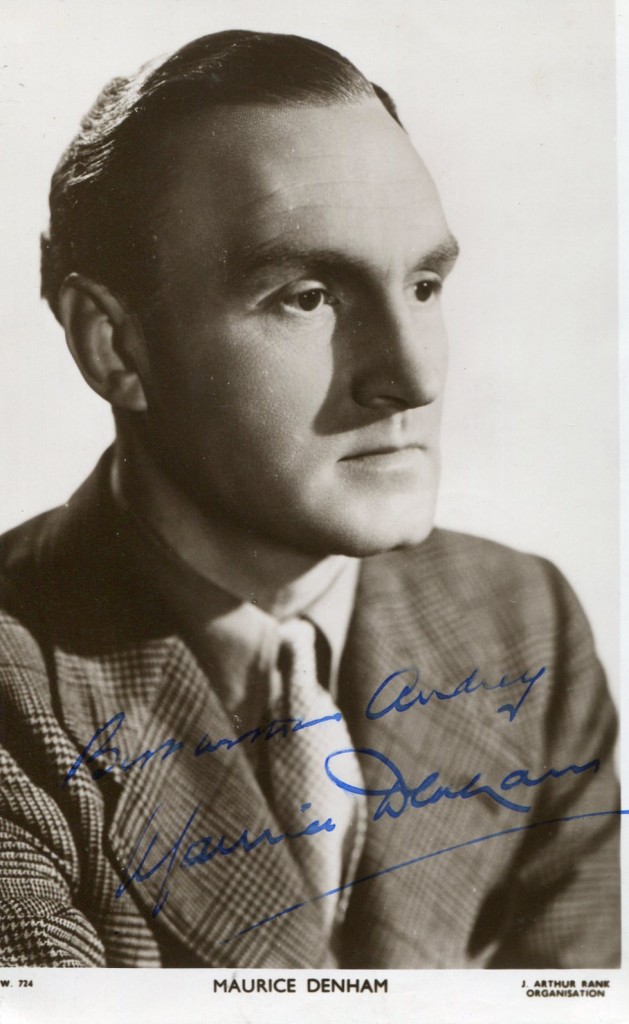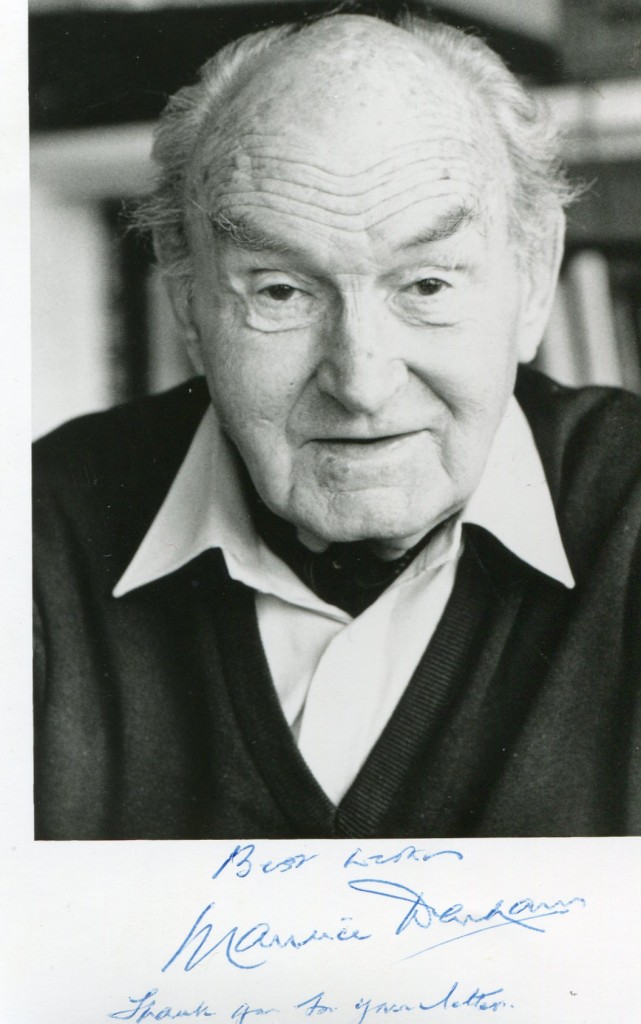

Maurice Denham was a profilic English character actor who envlivened many a British film from the 1940’s onwards. His films included “They Mad Me a Fugitive” in 1947, “Holiday Camp”, “Jassy”, “Madness of the Heart”, “The Captain’s Table” and “The Heroes of Telemark”. He died in 2002 at the age of 93.
Dennis Barker’s “Guardian” obituary:
That much-relished character actor Maurice Denham, who has died aged 92, was virtually a one-man chronicle of the decay of the respectable classes. Bald, intense, seedily immaculate, dead-eyed, slightly dotty, outwardly respectable and inwardly anarchic – his prototype delighted audiences in the great postwar years of the British film industry.
It was translated into radio, with comedians as varied as the manic Tommy Handley and the urbane Kenneth Horne, and into television from the first broadcasts from Alexandra Palace before the war, through The Lotus Eaters in the 1970s, to the 1980 series Edward And Mrs Simpson, when, almost inevitably, Denham played the pontificating Archbishop of Canterbury. He was also in Porridge, The Professionals and Peak Practice.
In more serious mode, he was perfect casting for high-ranking RAF officers masterminding the Battle of Britain, or admirals doing their best to cope, such as in the film of Graham Greene’s Our Man In Havana (1959). But his more usual appearances were as would-be gentleman crooks battling with suspicious landladies and wronged women in a shower of bouncing cheques. He was almost always a gentleman, genuine or false; and though his range was broader than that, when he stepped out of the genteel rut the results were less assured.
As the fag-in-mouth petty crook Jack Rufus, in the film of Norman Collins’ landmark novel London Belongs To Me (1948) – perpetually short-changing a gullible and baby-faced Richard Attenborough – Denham seemed uncomfortable; and as an idiosyncratic Macbeth, in the 1961 Old Vic production, he lacked some of the power thought to be inseparable from the role.
“He has played so many put-upon little clerks and bobbyish hubbies that I had almost expected, things being what they are in Shakespeare these days, that we might be in for a ‘little man’ Macbeth,” wrote the critic Philip Hope Wallace in the Guardian. But he added: “Not at all. Mr Denham contrived to look if not bloody, bold and resolute, as the vision recommends, at least burly, jovial and cunning.”
This quietly eccentric actor was born to gentility in Beckenham, Kent, and educated at Tonbridge school. He had a variety of jobs before becom- ing an actor. As an engineer, he helped install the lifts at Broadcasting House. His heart, however, was elsewhere – in the parts he played as an amateur actor.
He was first spotted while with an amateur group at the Old Vic, and offered a job with Hull Rep, for which, in 1934, he made his first professional appearance, in The Marquise at the city’s Little Theatre. Two years later, he made his first professional appearance in London, in Rain Before Seven at the Arts Theatre, and then featured in a series of West End plays, usually playing ineffectual older characters.
At the same time, Denham was appearing before a minuscule audience in BBC television productions from Alexandra Palace, a way of dipping his toes into the new medium while he also tried out the possibilities of radio.
The war, in which he served in the Buffs, did not completely interrupt his career, and was a source of comic accents and mannerisms which he later exploited in Tommy Handley’s ITMA (It’s That Man Again), for which he played Mrs Lola Tickle, and in Kenneth Horne and Richard Murdoch’s bizarre life at a fictional RAF station, Much Binding In The Marsh. His slighty cracked officers became a speciality long before the Goons became fashionable. His talent as “man of a thousand voices” was displayed again in 1955, when he voiced every character in the animated Animal Farm.
Denham made his first film appearance in 1947 with a small part in The Man Within, alongside Richard Attenborough, and then found that his presence was virtually compulsory in every British film, from Madness Of The Heart (1949) to Those Magnificent Men In Their Flying Machines (1965). In the 1970s, he was still going strong in a new wave of films like Sunday Bloody Sunday (1971) and The Day Of The Jackal (1973), and, in 1986, his scholastic presence in Helene Hanff’s 84 Charing Cross Road was moving. Practically every character he played was infused with an inner dignity, in spite of outward dissonances.
Nor was he frightened to appear at smaller theatres in efforts to broaden his scope. His Uncle Vanya, at Hampstead Theatre in 1979, and his Incident At Tulse Hill, at the same theatre, were evidence of versatility beyond his trademark parts.
I n person, Denham was as good, unpredictable fun as he was in his comic roles. He listed his hobbies as golf and conducting gramophone records. Julian Belfrage, his agent for most of a career that included well over 100 films, once took him with other clients, such as Harold Pinter and Peter Hall, to a Grand National party. In the sweep, Denham drew a horse called Go Far. When it was ahead at the first fence, he started shouting loud encouragement and jumping up and down like a schoolboy expecting to win a fortune, desisting only when the horse crossed the finishing line almost last. But, said Belfrage, such eccentricities were immaterial. If all his clients had been like Maurice Denham, he would have had a carefree life, because he was good company, personally pleasant and always in work.
His last role was as an aristocrat in The Beggar Bride in 1997, which starred Spooks actress Keeley Hawes.
In 1936, Denham married Elizabeth Dunn, by whom he had two sons and a daughter; she died in 1971. He was awarded the OBE in 1992.
· Maurice Denham, actor, born December 23 1909; died July 24 2002
The above “Guardian” obituary can also be accessed online here.


